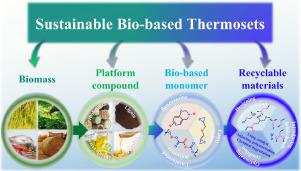Progress in Polymer Science ( IF 26.0 ) Pub Date : 2020-12-29 , DOI: 10.1016/j.progpolymsci.2020.101353 Jingkai Liu , Shuaipeng Wang , Yunyan Peng , Jin Zhu , Weiwei Zhao , Xiaoqing Liu

|
In polymer science and industry, the important role of thermosetting resin is well-recognized. However, most thermosets suffer from the overdependence on petroleum resource and in addition are linked to environmental concerns. The development of sustainable thermosetting resins thus has become an objective of contemporary research. Addressing this need generally requires renewable feedstocks, satisfied comprehensive properties, and long service life or recyclability. Herein, a systematic overview regarding recent advances in sustainable thermosetting resins is provided. Firstly, the origins and access of bio-based platform compounds successfully applied in the bio-based thermosetting resins are being discussed. Subsequently, the synthesis, structure-property relationships, and methodologies for the functionalization of three typical bio-based thermosets, including benzoxazine, epoxy resin and unsaturated polyester, are being reviewed. Finally, strategies for the recycling of bio-based thermoset waste products are being presented. The objective of this work is not only to summarize the recent progress on sustainable thermosets, but also help us understand them more deeply and widely in a short time, so as to promote their faster development.
中文翻译:

可持续热固性树脂的进展:从可再生原料到高性能和可回收性
在聚合物科学和工业中,热固性树脂的重要作用已广为人知。但是,大多数热固性塑料都过度依赖石油资源,而且与环境问题有关。因此,可持续的热固性树脂的开发已成为当代研究的目标。为了满足这一需求,通常需要可再生原料,令人满意的综合性能以及较长的使用寿命或可回收性。在此,提供了关于可持续热固性树脂的最新进展的系统概述。首先,讨论了成功应用于生物基热固性树脂的生物基平台化合物的起源和获取。随后,合成,结构-属性关系,对三种典型的生物基热固性塑料(包括苯并恶嗪,环氧树脂和不饱和聚酯)的功能化方法进行了综述。最后,提出了回收基于生物的热固性废品的策略。这项工作的目的不仅是总结可持续热固性塑料的最新进展,而且还帮助我们在短时间内更深入,更广泛地了解它们,从而促进其快速发展。





















































 京公网安备 11010802027423号
京公网安备 11010802027423号